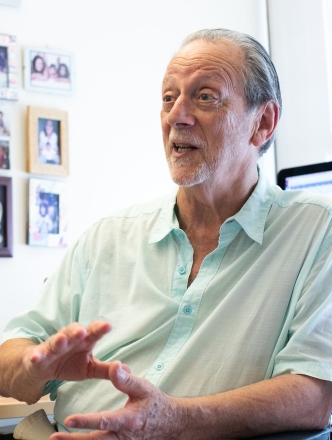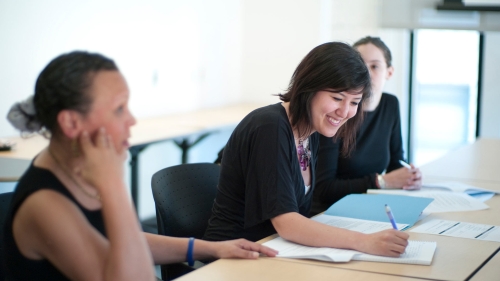
The Psychology and Social Intervention (PSI) doctorate prepares action scientists for diverse roles in academia and social research. You will be prepared to understand, transform, and improve the contexts and systems in which humans develop across the lifespan.
Request Info
Degree Details
Official Degree Title
Why Psychology & Social Intervention?
You should apply to PSI if you…
- are committed to conducting applied research to promote justice and equity
want to develop conceptual and methodological skills to understand the interplay between people and settings/social systems
want to take an interdisciplinary approach to research
want to work in partnership with practitioners, policymakers, and community members
want to work in academia, industry, government, policy, program development and others!
PSI is a research-intensive degree with a strong quantitative training component that places a strong emphasis on:
- understanding and assessing social settings, systems, and policies;
- creating/improving, implementing and evaluating prevention and intervention programs; and
- understanding various forms of diversity and structural inequality among individuals, institutions, communities, and societies.
Students work collaboratively with faculty mentors on a range of activities, including study design, data collection and analysis, manuscript preparation, conference presentations, policy briefs, and evaluation activities.
Program faculty study a wide range of ecologies (e.g., families, schools, neighborhoods, policy contexts, programs) and preventive and policy interventions (e.g., psychological, social, educational and health programs) locally, nationally and internationally. Our faculty also conduct research on how cultural factors and identities influence and interact with experiences of these ecologies and interventions. Our New York City location provides an ideal urban setting for studying many kinds of communities, combined with gateways to the world at large.
In the PSI program, we focus on providing the framework to help you:
develop methodological skills that enable analysis of change over time and within and across levels of human ecology
acquire abilities to apply psychological and social science principles to the understanding of social settings, social/cultural contexts, and social and policy interventions
develop abilities to conceptualize, interpret, evaluate and disseminate evidence-based social and policy interventions; and develop the ethical, interpersonal, organizational, and technical capacities to undertake high-quality professional work in psychology and social intervention
The PSI doctorate trains social scientists to work in a variety of settings so they understand the experiences of people in the contexts and systems in which they develop across the lifespan, and can transform and improve these contexts and systems.
Our degree prepares students for diverse roles in academia and applied research. In the academic arena, our students are well positioned for jobs in psychology, human development, education, public health, and public policy. In the area of applied research, you will be prepared to obtain positions in research organizations, policy institutes, social service agencies, community-based organizations, and advocacy.
Our rigorous theoretical and empirical training will position you extremely well to respond to the ever-increasing demand for evidence-based prevention and intervention strategies in health, education, and social services.
If you’re an international student, you may be able to work in the United States after graduation for an extended period of time. Most students studying on F-1 visas will be eligible for 12 months of Optional Practical Training (OPT) off-campus work authorization. F-1 students in our program may also be eligible for the STEM (Science, Technology, Engineering, or Mathematics) OPT extension, allowing you to extend your time in the United States to pursue degree-related work experience for a total of 36 months or 3 years. For more information on who can apply for this extension visit NYU’s Office of Global Services: STEM OPT.
Psychology & Social Intervention PhD Admissions Information
-
In this PSI 101 video, students from the Psychology and Social Intervention (PSI) Doctoral Program will teach you about a wide range of topics, including the curriculum, PhD requirements, timelines, and the breadth of research conducted in the program.
-
The doctoral program in Psychology and Social Intervention at NYU is a small training program; thus, we pay close attention to the match between the candidate and the program’s faculty and resources. We seek to admit students whose perspectives align with the program as a whole and whose research interests are well-matched with those of one or more faculty members. Rather than being assigned to work with a particular faculty member, admitted students participate in a mutual matchmaking process with faculty at the start of their training to determine their initial mentor. They are actively encouraged and supported to work with multiple faculty members starting in their 3rd year.
The following PSI faculty will be available to serve as primary research mentors for the Fall 2026 admissions:
- Rezarta Bilali
- Florencia Lopez Boo
- Jorge Cuartas
- Diane Hughes
- Pamela Morris-Perez
- Michelle Twali
The following PSI faculty will be unavailable to serve as primary research mentors for the Fall 2026 admissions. However, these faculty are potentially available to serve as additional mentors in later years of training, so we encourage you to write about your interests and experiences that demonstrate that you are a good match with the program as a whole.
- J. Lawrence Aber
- LaRue Allen
- Elise Cappella
- Alejandro J. Ganimian
- Erin Godfrey
- Edward Seidman
- Hirokazu Yoshikawa
-
The GRE (both the general test and the GRE subject test) is not a requirement for applications to the Psychology and Social Intervention PhD Program. Even if GREs are submitted, they will not be considered.
-
NYU Steinhardt offers a competitive funding package for PhD students who study full-time. Learn more about Steinhardt's funding opportunities.
-
- Please visit the How to Apply page for more information on application requirements.
- Please review our FAQ page to find out more information about the PSI program and application process.
Questions:
- If you have any additional questions about our degree, please feel free to contact us at applied.psychology@nyu.edu.
Take the Next Step
Advance your personal and professional journey – apply to join our community of students.
Apply Now